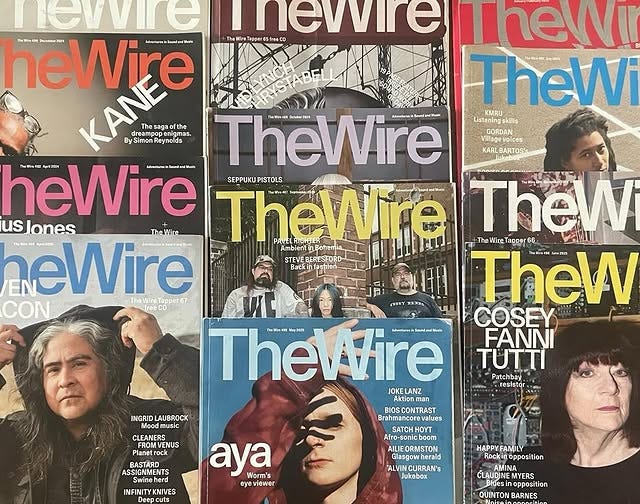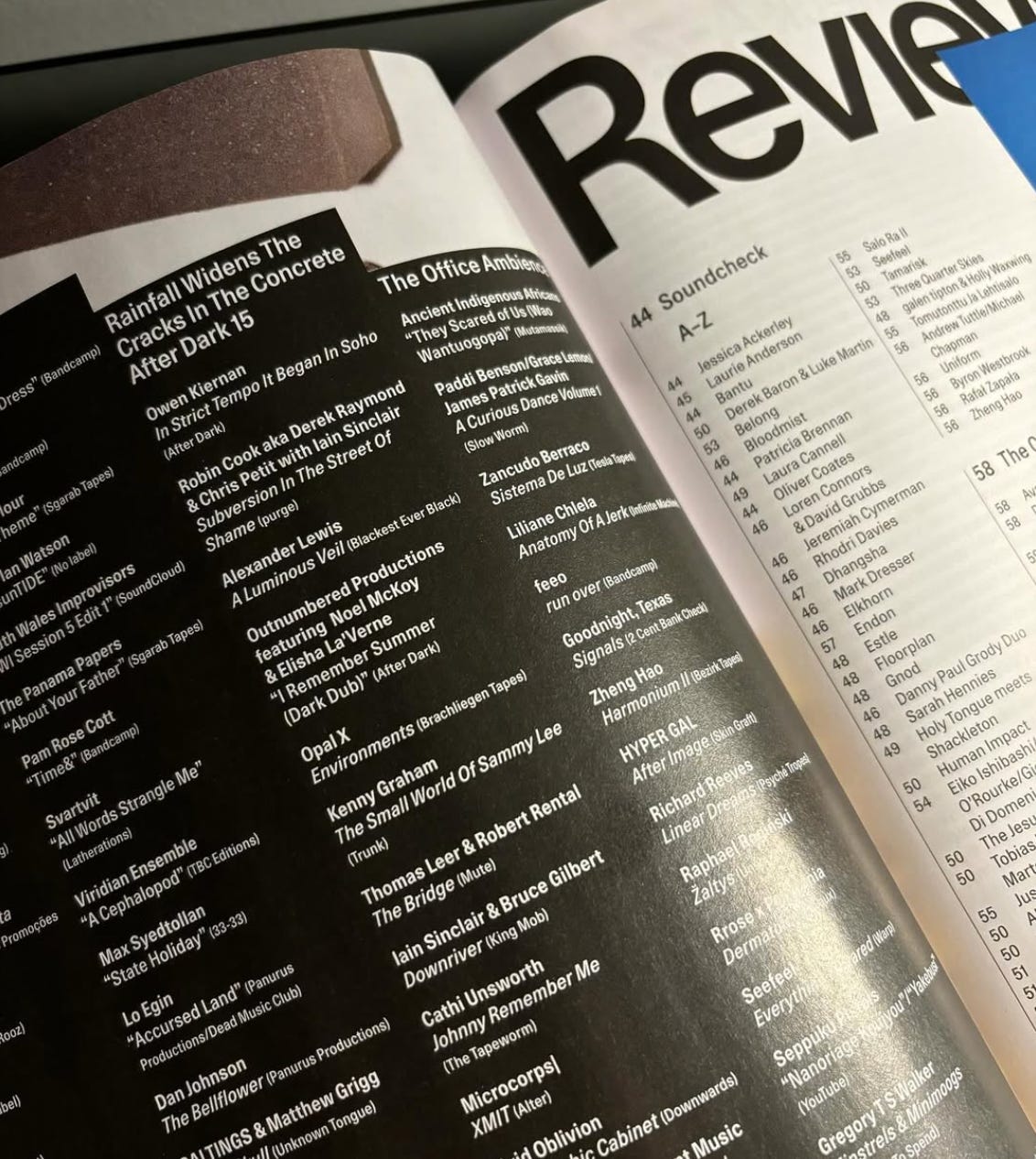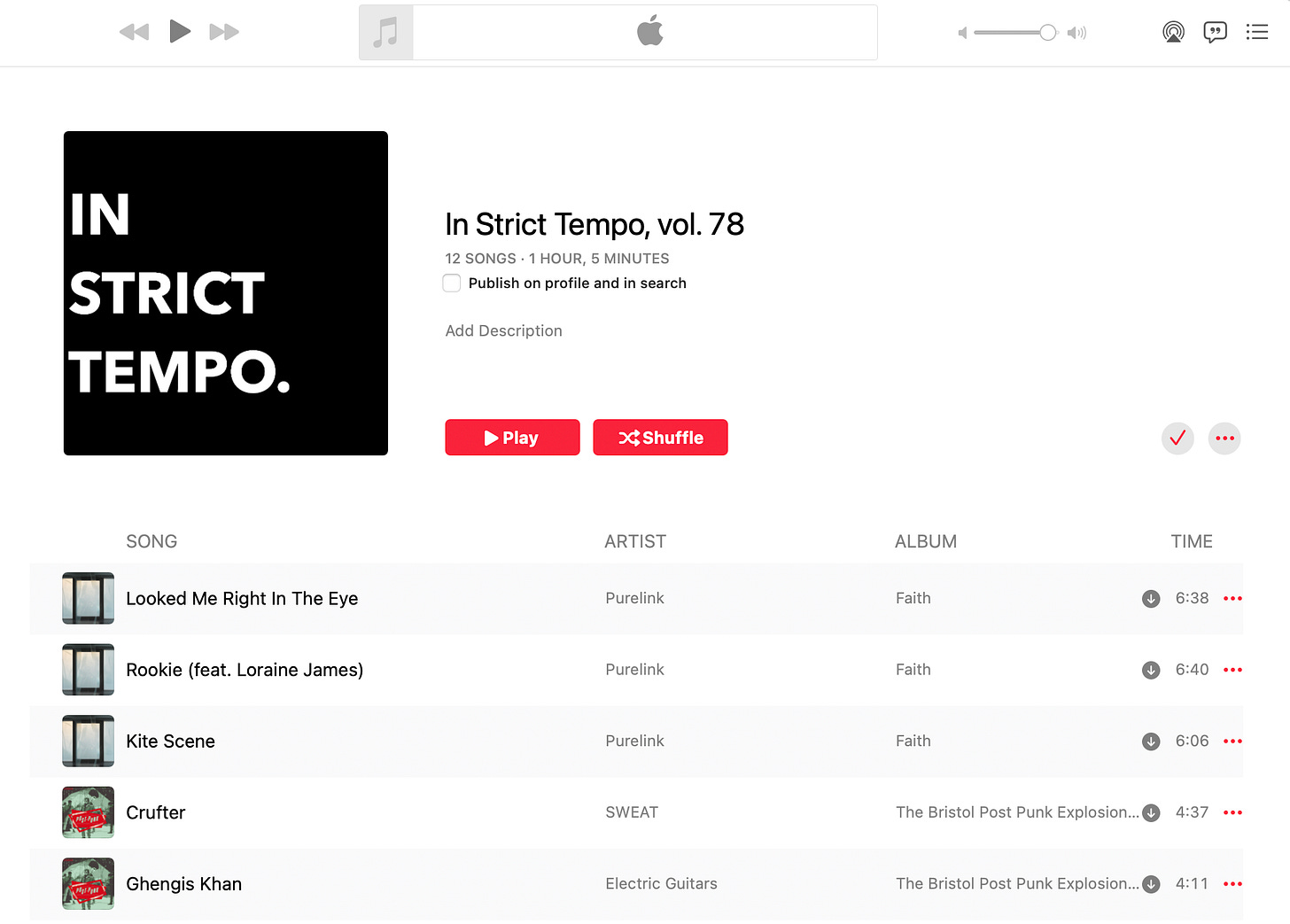In Strict Tempo, vol. 78: Totally Wired
A couple of weeks ago the venerable UK music magazine The Wire put out a plea on their social media channels. They needed subscriptions. This came as a shock to many, even us who are well aware of the state of the music press these days. How could The Wire, that bastion of music writing, be struggling? Surely The Wire would have enough subscribers to be viable, as it has thrived for the past 40-something years, living through the rise of the CD, the download, streaming, and numerous ‘vinyl revivals’.
It would appear not.
Skip the next bit if. you want, the story has had a happy ending (for now). The subscription drive worked, and the future of the magazine is safe for a while longer.
The Wire was founded in 1982, and has published a monthly issue ever since. Originally focussed on jazz - and more specifically the jazz avant-garde, the magazine’s remit widened as the years went on. Nowadays it covers pretty much every kind of music imaginable, from almost every corner of the world, and plenty of things that would struggle to pass for ‘music’ too. The Wire doesn’t discriminate - if it’s interesting, they’ll write about it.
I can’t remember exactly the first issue I bought (I think it was most likely November 2003 with Aphex on the cover, or the December issue with Raster-Noton), so I’ve been reading it for some 20 plus years now, and have subscribed on-and-off during that time as finances allowed. I last took out a subscription during COVID and kept it for a few years, eventually letting it lapse for reasons I’m not quite sure of. I renewed it again in December 2024.
Thanks to an excellent online archive (every page of every issue going back to the first is digitised and available to subscribers to search or read at leisure) I often find myself back at certain points in time, reading the features and reviews, recalling stuff I’d forgotten about, discovering things I passed over at the time. Researching this piece I find myself re-reading features on Jamie Liddell, LCD Soundsystem and Boards of Canada (all 2005), 60 groundbreaking cover versions (November 2005), 60 concerts that shook the world (Feb 2007), Jeff Mills, Kode9 and Broadcast (all 2009) the list goes on. I’ve not really gone too far back into the archive into the 90’s, but I suspect there’s some real gold in there too.
My favourite section of the magazine has always been the long-running Invisible Jukebox feature. The premise of this is each month a Wire writer will meet with (or increasingly post-Pandemic Zoom or telephone) a musician and play them a selection of records, the ensuing conversation being recorded and making up the feature. Some musicians know almost everything they’re played (although the writers like to throw in the odd curveball sometimes, it’s never in an attempt to catch them out or show them up), but some aren’t so clued up. I don’t think that’s any slight on the musician, lots of music is difficult to identify from a short snippet, and musicians are no less immune to the odd “errrr…. I know this… give me a minute” than the rest of us.
Along with the online archive and magazine The Wire also publishes a series of CDs called The Wire Tapper, since the late 1990’s. I’ll admit I only listen to them occasionally (my only CD player now is in my car), but they’re always a good snapshot of what’s going on with experimental and underground music.
Of course, The Wire isn’t perfect. A lot of what they cover is too esoteric and highbrow even for me, but it’s a magazine that rewards the open-minded. I’ve lost count of the amount of music I’ve discovered from there, so it was a real highlight when friend of the newsletter Luke J Murray included In Strict Tempo in his After Dark readers chart last summer.
So yes, it was a real shock to read that the magazine was struggling. If The Wire can’t make it work in the current climate then what hope does anyone else have? It’s not a stretch to call it an institution, and for many musicians it remains the only major outlet that would even consider covering their work. The only site that’s even remotely comparable is The Quietus, and they’re not without their own financial struggles, having very candidly laid out their position last year (I subscribe to both).
One of the reasons I keep In Strict Tempo free is that I feel that there’s places more deserving of peoples money than this. I’m fortunate to earn a living from music already, but many people creating or promoting music don’t. As consumers we only have so much spare cash at the end of the month, and it’s vital we support the music scene where we can. In Strict Tempo is a labour of love, but it’s something I enjoy and I’d feel uncomfortable taking money from readers (or indeed, artists/labels who wanted to advertise) that could be better used elsewhere.
If you like the kind of music I cover and enjoy reading about the kind of music that doesn’t really get written about anywhere else then I really recommend taking out a subscription - It’s £65 a year (the price of many Substacks) in the UK and £100 for the Rest of the World. You can subscribe digitally only (and still get full access to the archive, plus regular downloads of new music) for just £40, and honestly it’s worth every penny. They’re not paying me to write this, it’s coming from the heart - the underground & experimental music worlds will really suffer without The Wire.
New Music
Purelink - Faith [Peak Oil]
A new album of trippy ambient from some of the best at it right now. This one is one to melt away to, there’s not really much more I can say other than put it on if yr feeling stressed.
VA - Bristol Post Punk Explosion, vol. 3 (1979-1985) [Bristol Archive Records]
You know what? I’ve never been to Bristol. Other than stopping somewhere on the outskirts for a piss on the way back from Glastonbury one time, I’ve never really set foot in the city. I should probably rectify that… Anyway, a third volume of Bristolian post-punk from the genre’s heyday here. Some of these tracks are better than others, I’ll leave it up to you to decide what’s what, but a few of them have a bit of a jazz-funk vibe that isn’t really my bag. You can definitely hear the beginnings of a musical movement that would eventually become trip-hop in a few of these, so all in all it’s an interesting document.
LNS & DJ Sotofett - Globus Trax [Tresor]
I didn’t think dance music still sounded this good. Not as ‘Berlin’ as you might expect from Tresor, there’s a nice thread of acid running through this EP.
Memotone - Time Is Away Theme [World of Echo]
A new album from Memotone is on the way via the good folk at World of Echo (who’ve themselves moved into a new shop recently - be sure to check it out!). This first single conjures up images of the English countryside, folk tales and church spires. Sonically, it’s not quite the same as previous Memotone albums, it feels more open, less claustrophobic, but there’s still something to be found here if you enjoyed his other tracks, and there’s a sliver of familiarity there the more you listen. I’m looking forward to hearing the rest of this.
Mentocome - s/t (1992) [Amok Age]
Okay, so only one of these tracks is on streaming sites, courtesy of a compilation from eight or so years ago, but this album has just had a vinyl reissue. How to describe it? Post-industrial outsider electronica from post-reunification Germany. If you liked that CHBB reissue, or anything along that timeline, this is gonna be right up your street.
Civilistjavel x Mayssa Jallad - Marjaa: The Battle of the Hotels (Versions) [Six of Swords]
Civilistjavel brings his haunting post-dub sound palate to Lebanese singer Mayssa Jallad’s 2023 album, a reflection on the country’s civil war. Boomkat have put it best, describing it as “something like a Chain Reaction-produced This Mortal Coil”, I’m not gonna do any better than that.
That’s it for this week - thanks as always for reading & subscribing, and sharing to those who’ll also enjoy In Strict Tempo. Please support online and bricks-and-mortar record shops equally! Don’t forget to subscribe to The Wire!





